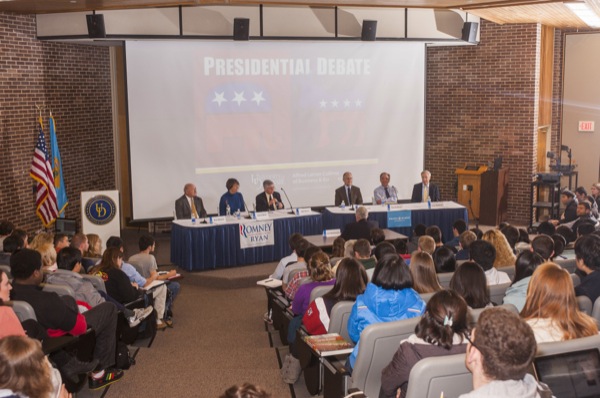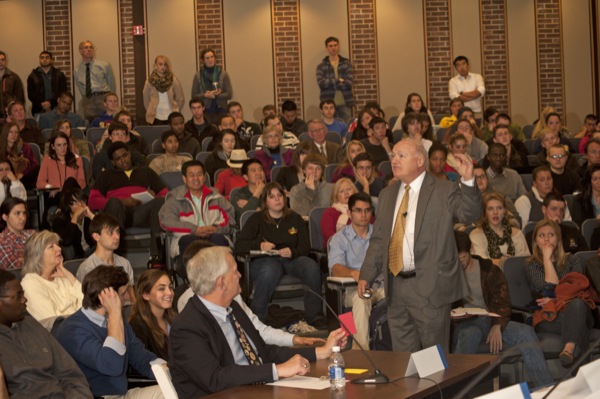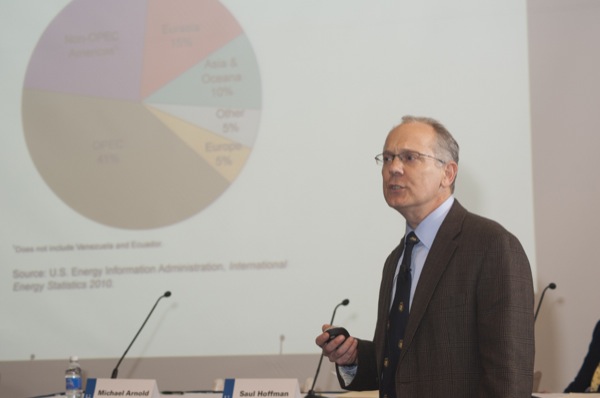


Presidential debate
Department of Economics hosts election eve presidential policy debate
10:52 a.m., Nov. 16, 2012--On the eve of the presidential election, six University of Delaware professors from the Department of Economics discussed the proposed economic policies of President Barack Obama and Gov. Mitt Romney at a public debate, “Obama vs. Romney: The Economic Policies of the 2012 Campaign,” on Friday, Nov. 5, in Purnell Hall.
Almost 300 students, faculty and community members gathered at the event, which is sponsored every four years in conjunction with the presidential elections by the department in the Alfred Lerner College of Business and Economics.
Campus Stories
From graduates, faculty
Doctoral hooding
The faculty covered topics ranging from economic recovery, job creation and government deficits to tax policy, health care and the environment.
Michael Arnold, associate professor and director of UD’s Honors Program, Saul Hoffman, professor, and Larry Seidman, Chaplin Tyler Professor of Economics, represented the economic views of Obama, the Democratic incumbent who went on to win re-election.
Supporting the views of Republican challenger Romney were Burt Abrams, professor, Stacie Beck, associate professor, and Will Harris, associate professor.
“Coming out of difficult economic periods the economy becomes an important factor in the election,” said Jim Butkiewicz, chair of the department and moderator of the debate, which was aimed at educating students on some of the prominent economics issues facing each candidate.
Seidman, who opened the debate for “Team Obama” said the economy could be much worse than it is now. He targeted the Republican-dominated House of Representatives as a potential reason the stimulus was not as successful as the president intended and claimed the amount of money pooled into the economy should have been twice as large.
“People seem to think we have a dictator or king as president,” said Seidman. “You need the House and the Senate to pass anything and this has left us with a very weak recovery. If the same group of people gets reelected, it will be worse.”
Supporting “Team Romney,” Harris countered Seidman’s arguments by examining some of the flaws in Obama’s economic policy. He concluded the hope and change promised in 2008 led to significant disappointment in 2012.
“Don’t be duped again,” said Harris. “We can do better simply by not doing bad again. Romney pledges to undo the past with more freedom of enterprise.”
Harris also pointed to charts and graphs to indicate Obama’s policies fared worse in his term than did President George W. Bush’s policies in areas like average monthly unemployment, average annual GDP growth, average federal budget deficit and real median family income.
Arnold criticized Romney’s plan for energy independence and called his policies unrealistic in terms of supply and demand as they relate to America’s gas reliance internationally.
Arnold also stressed that a private equity shareholder like Romney should not be trusted as president.
Abrams responded to Arnold, likening steering the economy to steering a ship.
“There are vital decisions and policies that need to be made to keep the country afloat,” said Abrams, who also criticized the downgrading of the U.S. government credit rating under the Obama Administration.
“This is quite embarrassing when it is declared that the United States’ securities aren’t Triple A rated,” Abrams said.
According to Abrams, who used a subsidy calculator to determine that a family of four earning $80,000 a year would be eligible to receive $9,000 in cash credit toward health insurance under the Affordable Care Act, also known as “Obamacare,” the money doesn’t add up.
“Where is all this money going to be coming from?” asked Abrams.
Abrams criticized Obama’s policies by saying his program raises the size of government and redistributes income from earners to non-earners and touted Romney’s plan, which forecasts significant economic growth.
“Of the two candidates, Gov. Romney is the only one who seeks to restrain the future massive growth of government and present tax reforms that enhance economic efficiency rather than reduce it,” explained Abrams. “Obama’s entire program is to raise the size of government, redistribute income from earners to non-earners and subsidize inefficient enterprises. There is scarcely any aspect of his agenda that doesn’t need improvement.”
Hoffman defended Obamacare, claiming Republicans demonize the Affordable Care Act by pretending its measures are too radical for the country.
“It is a truly landmark piece of legislation that belatedly and finally brings the United States in the company of many developed countries around the world that provide near universal aspects of health care,” Hoffman said. “There’s no excuse for a country as wealthy as the United States to have 49 million citizens without health care.”
Hoffman suggested that Romney’s health insurance proposal would have reverted the country to insufficient policies from 10 years ago.
“Romney’s plan is literally to repeal the Affordable Care Act and let states do whatever they want,” said Hoffman. “I think the Affordable Care Act came from a policy that was advocated by Republicans and implemented under Romney. To propose nothing is an absence of leadership on a very important topic.”
Beck argued this period is one of the slowest economic recoveries in history and predicted further stagnation if Obama is reelected. She asserted the stimulus package reflected economic theory that was discredited more than 30 years ago.
“What has happened in this recession is job creation has stopped, so the layoffs have stopped but job creation is not occurring anymore,” Beck said. “We have to improve investment and we have to encourage new firms to come out and invest.”
The department holds the debates in hopes the economic principles that drive the economy and that were debated will resonate among students as the country moves forward. Audience members laughed as the disputing professors incorporated traces of humor in their arguments to lighten the seriousness of the economic principles discussed.
“We really hope the students will take the economic issues seriously and think about them, and I think they did,” said Butkiewicz. “The primary goal is to inform but entertainment generally occurs.”
Article by Danielle C. DeVita
Photos by Duane Perry










